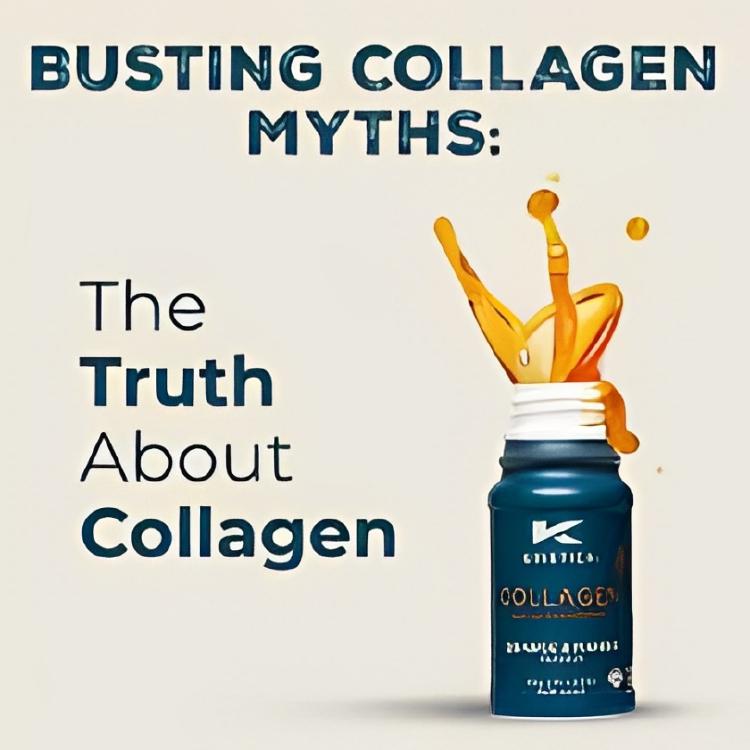Debunking Collagen Myths: The Science Behind Supplements for Skin Health
Explore the science behind collagen supplements and their impact on skin health. Learn if they really work and debunk common myths. Your guide to better skin.

- Seo Yuna
- 3 min read

The Truth About Collagen Supplements: Separating Fact from Fiction
Collagen supplements have become a hot topic in skincare, often surrounded by misinformation and skepticism. Let’s delve into the science and debunk some common myths, exploring whether these supplements truly benefit your skin.
Myth 1: Collagen Supplements Are Just Instagram Hype
The idea of using collagen peptides to influence tissue behavior isn’t new. Research dates back to the 1970s, proving it’s a well-established field, not just a trendy fad. It is important to distinguish between whole collagen and collagen hydrolysates. Most supplements use collagen hydrolysates, broken-down into peptides, which have specific properties.
Myth 2: Oral Collagen Doesn’t Reach the Skin
Contrary to popular belief, ingested collagen peptides don’t just get digested into basic amino acids. Studies on mice and humans have demonstrated that these peptides can be absorbed into the bloodstream. These peptides, thanks to specialized transporters in the gut, can enter the bloodstream intact. Some studies have even tracked these peptides using radioactive markers, showing their accumulation in collagen-rich tissues like skin and cartilage.
Myth 3: If They Reach the Skin, They Don’t Do Anything
Collagen peptides are not inert; they have cell-signaling properties. They can influence the genetic makeup of skin cells, promoting the production of collagen and elastin. Additionally, they can inhibit the activity of MMPs, enzymes that degrade collagen. These peptides interact with cell receptors and peptide transporters, changing cellular behavior and function. This is different from any other protein.
Myth 4: It’s All Just In Vitro Evidence
While in vitro studies are valuable, there’s significant in vivo data supporting the benefits of oral collagen peptides. Numerous studies, including double-blind, randomized, placebo-controlled clinical trials, have demonstrated their ability to enhance skin hydration, elasticity, and collagen content. Meta-analyses have also shown an overall positive effect of collagen supplementation, even when commercial biases are considered.
Myth 5: Any Protein Would Do the Same Thing
It’s a misconception that any protein will achieve similar results. Studies using control proteins like casein or albumin have shown that the skin benefits seen are unique to collagen peptides. These peptides have specific bioactivity, distinguishing them from simple protein building blocks. Clinical trials have shown that collagen hydrolysate outperformed other protein sources in wound healing, bone modulation, and skin health.
Myth 6: Most Studies Are Commercially Funded and Unreliable
It’s true that many collagen studies are commercially funded. The beauty industry does not receive the same scrutiny as pharmaceutical research. However, bias analyses of these trials have generally been favorable. Furthermore, consistent results across diverse studies, including those from other fields and in vivo animal models, suggest genuine benefits.
User Insights:
Some users have reported seeing positive impacts on skin elasticity and hydration after taking collagen supplements consistently. A few individuals mention that their mothers, dealing with issues like dry skin, saw noticeable improvements after supplementing with collagen.
However, it’s important to note that not all collagen is the same. One person mentioned an allergic reaction to a supplement derived from seafood, which was a vital piece of information to share. Some users suggest that it could take at least six weeks to see results from collagen supplementation, which highlights the need for a long-term commitment for those who decide to try it.
The Bottom Line
The data isn’t perfect, but evidence supports the claim that collagen supplements have potential benefits for skin health. This isn’t health advice; anyone considering supplements should consult a healthcare professional. However, the argument that there is no evidence simply doesn’t hold up. The science is compelling. For skincare enthusiasts, collagen supplements offer another tool in the arsenal to maintain and improve skin health.
Disclaimer: This blog post is for informational purposes only and does not constitute medical advice. Always consult with a healthcare professional before starting any new supplement regimen.
Unlock Your Healthiest Skin – Backed by Science and Personalization
Cosmi is your personal AI cosmetologist — offering tailored skincare recommendations and expert advice based on your unique skin type, concerns, and goals.
Visit Cosmi